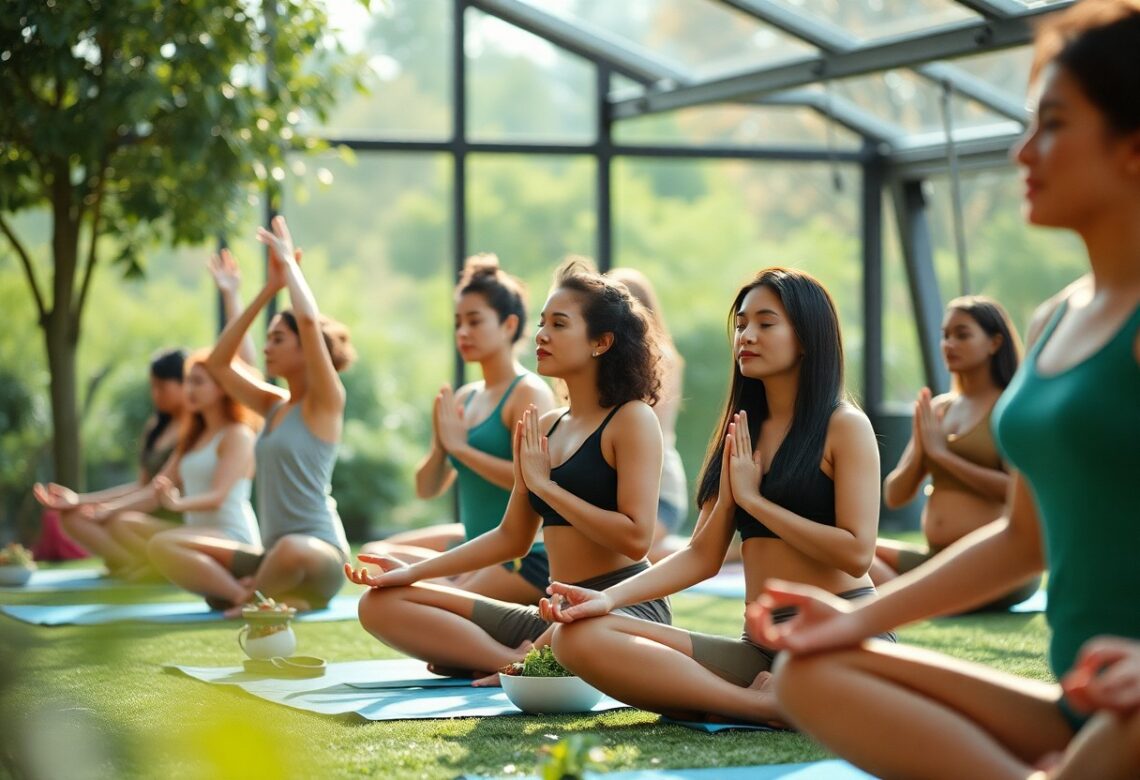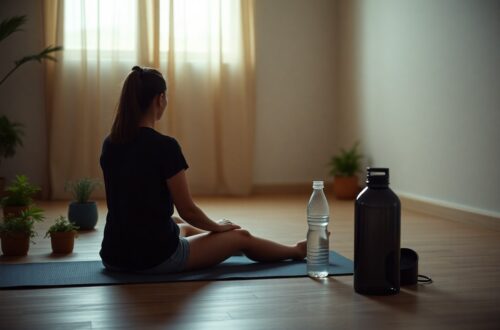It’s crucial to foster a positive body image for your overall well-being and self-esteem. In this blog post, you will discover effective strategies that can help you improve your perception of your body and enhance your self-acceptance. From mindfulness practices to engaging in supportive communities, these tips are designed to empower you on your journey towards a healthier self-image. Embracing these strategies can lead to a more fulfilling and confident life, ultimately making you feel comfortable in your own skin.
Key Takeaways:
- Self-acceptance: Embrace and appreciate your unique body traits to foster a positive self-image.
- Positive affirmations: Utilize daily affirmations to counter negative thoughts and promote a healthier mindset.
- Limit social media exposure: Reduce time spent on social media platforms to avoid comparison and negative influences.
- Surround yourself with positivity: Cultivate relationships with supportive people who uplift and encourage you.
- Focus on wellness: Shift your focus from appearance to overall health by engaging in activities that promote physical and mental well-being.
- Seek professional guidance: Consider consulting with a therapist or counselor for personalized strategies and support.
- Educate yourself: Learn about body positivity and the impact of societal standards to better understand and challenge harmful perceptions.
Understanding Body Image
To truly improve your body image, it’s vital to understand what body image means. Body image refers to how you perceive your own body, encompassing your thoughts, feelings, and beliefs about your physical appearance. This self-perception can greatly impact your mental health, self-esteem, and overall well-being, making it important to unravel the complexity of your body image.
The Psychology of Body Image
The way you see yourself is influenced by various psychological factors, including societal standards of beauty and personal experiences. You might find that your self-esteem plays a significant role in how you view your body, which can sometimes lead to negative self-assessment and distorted perceptions.
Factors Influencing Body Image
Body image is shaped by numerous external and internal factors, including:
- Media portrayal of beauty standards
- Feedback from family and friends
- Your personal experiences with weight and fitness
- Cultural or societal norms
Perceiving your body through these influences can either uplift or diminish your self-esteem and affect your mental health.
This complex interplay of factors often results in a multifaceted experience of body image. Your perception can vary from day to day, influenced by interactions and messages you receive in daily life, such as:
- Social media engagement
- Comparisons with others
- Your relationship with food and exercise
- Personal achievements and milestones
Perceiving these factors allows you to gain clarity on how they mold your body image, leading to an informed approach for improvement.
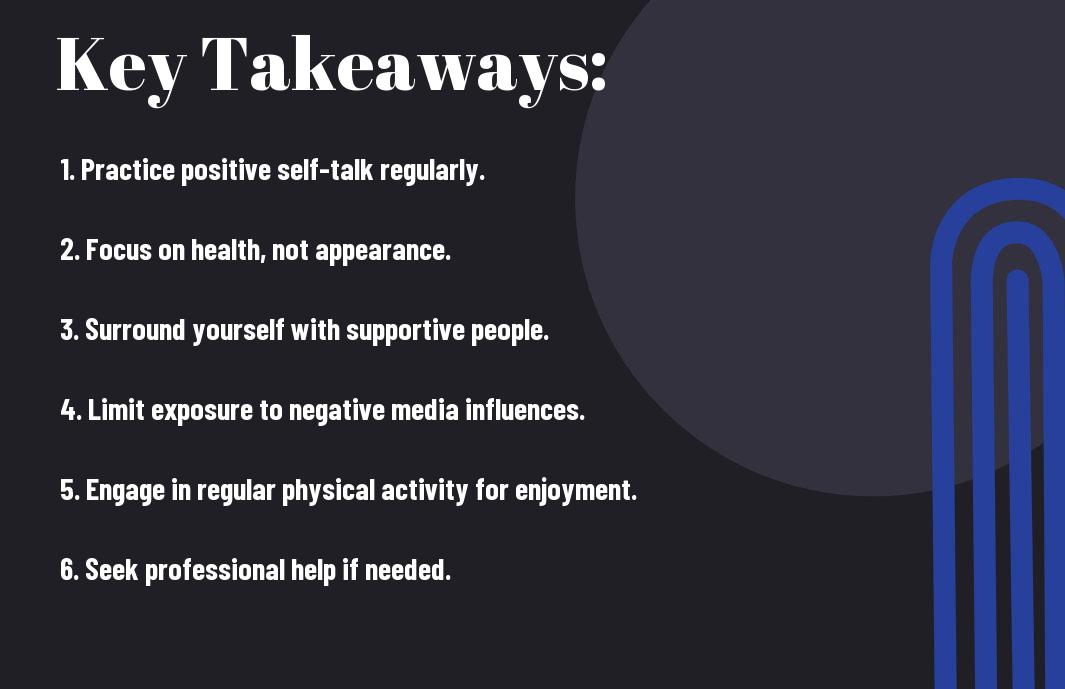
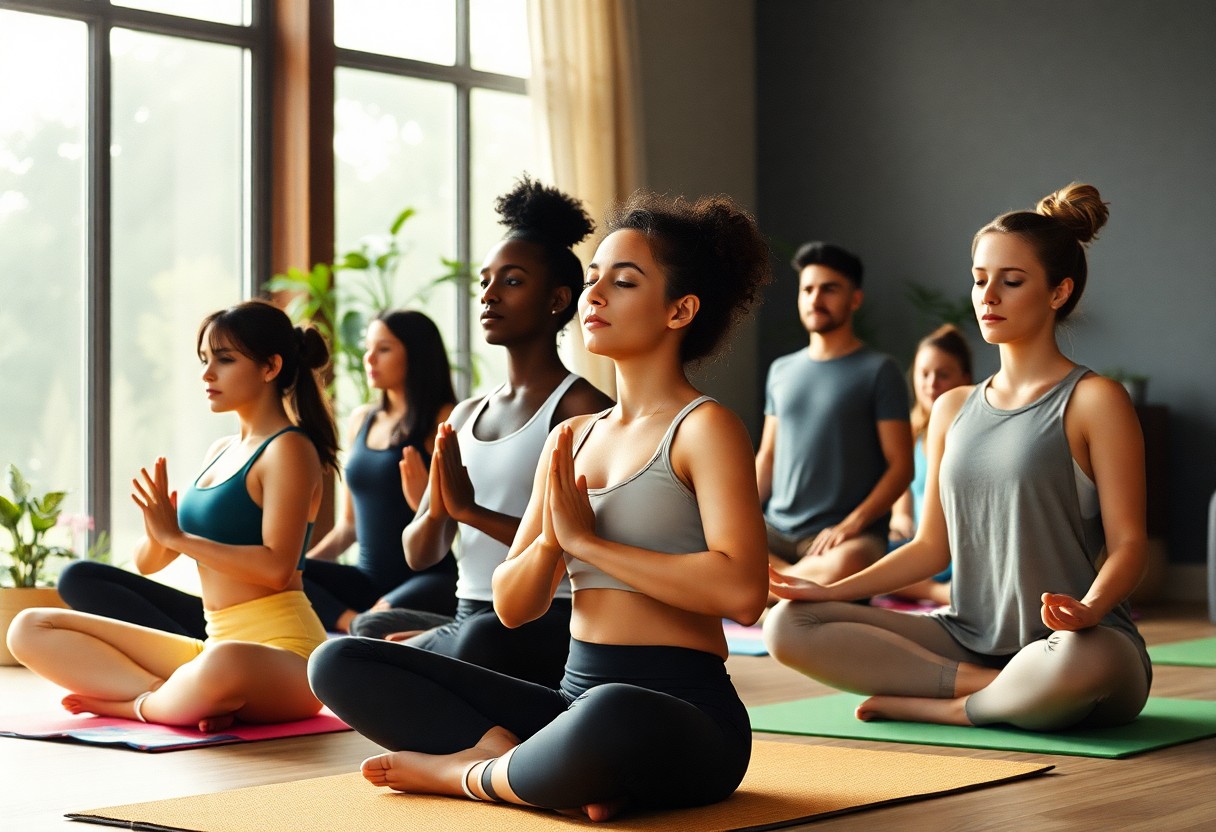
Healthy Lifestyle Choices
Some effective ways to enhance your body image include adopting healthy lifestyle choices. Engaging in optimal nutrition and regular physical activity can significantly influence how you perceive yourself. For more insights on Boosting body image, explore various strategies that assure positive transformations in your self-view.
Nutrition and Body Image
After incorporating balanced nutrition into your daily routine, you may notice a substantial improvement in your body image. A diet rich in whole foods, fruits, and vegetables nourishes your body and enhances your mood, allowing you to appreciate your physical self more positively.
Exercise and Physical Activity
Along with a nutritious diet, maintaining regular exercise and physical activity can greatly influence your body image. Engaging in activities that you enjoy helps promote positive feelings and boosts your self-esteem.
Consequently, regular exercise not only improves your physical health but also enhances your mental well-being. When you engage in physical activities, your body releases endorphins, which can lead to improved mood and self-perception. Prioritize exercises that feel enjoyable for you, as finding joy in movement helps cultivate a healthier relationship with your body.
Mindfulness and Body Positivity
Unlike conventional approaches that focus on appearance and societal standards, mindfulness encourages you to cultivate awareness and acceptance of your body as it is. This practice invites you to engage with your thoughts and feelings non-judgmentally, enhancing your overall body positivity. By fostering a deeper connection between your mind and body, you can learn to appreciate your unique attributes and dispel harmful narratives surrounding body image.
Practicing Self-Compassion
Among the most effective ways to improve how you feel about your body is to practice self-compassion. This involves treating yourself with the same kindness and understanding that you would offer to a friend. By focusing on your inherent worth and accepting your flaws, you can cultivate a more loving relationship with yourself, allowing you to break free from self-criticism and negative body talk.
Techniques for Mindfulness
Among the various techniques you can use to enhance mindfulness, deep breathing, body scans, and meditation stand out. These practices encourage you to focus on the present moment while paying attention to your physical sensations, thoughts, and emotions. By establishing a routine with these mindfulness strategies, you can gain insight into how your thoughts influence your body image and, ultimately, empower yourself to foster a more positive self-view.
Hence, integrating these techniques into your daily routine can create a transformative shift in your body image perspective. Start with simple deep breathing exercises to ground yourself and develop a heightened awareness of your feelings. Progress to body scans, where you mentally acknowledge each part of your body, appreciating its function rather than its appearance. Meditation can also help you cultivate a space for self-reflection and acceptance, further strengthening your mindfulness practices and enhancing your journey towards body positivity.
Social Media and Body Image
For many, social media plays a significant role in shaping body image and self-esteem. You can learn more about the relationship between body image and self-esteem in this article on Body Image and Self-Esteem (for Teens). Awareness of the messages you consume online can help you foster a healthier view of yourself.
The Impact of Social Media
Across various platforms, social media can significantly influence how you perceive your body. Exposure to meticulously curated images can lead to unrealistic standards and feelings of inadequacy, impacting your mental health and self-worth.
Creating a Positive Online Environment
Before engaging with social media, it’s crucial to curate your online experience to promote positivity. You can do this by following accounts that encourage self-acceptance and body diversity, and unfollowing those that perpetuate harmful ideals.
To create a positive online environment, assess the content you consume regularly. Seek out influencers who promote body positivity, inclusivity, and realistic portrayals of beauty. Take time to evaluate how specific accounts make you feel and make adjustments where necessary. By fostering a supportive digital space, you can enhance your body image and cultivate a healthier mindset.
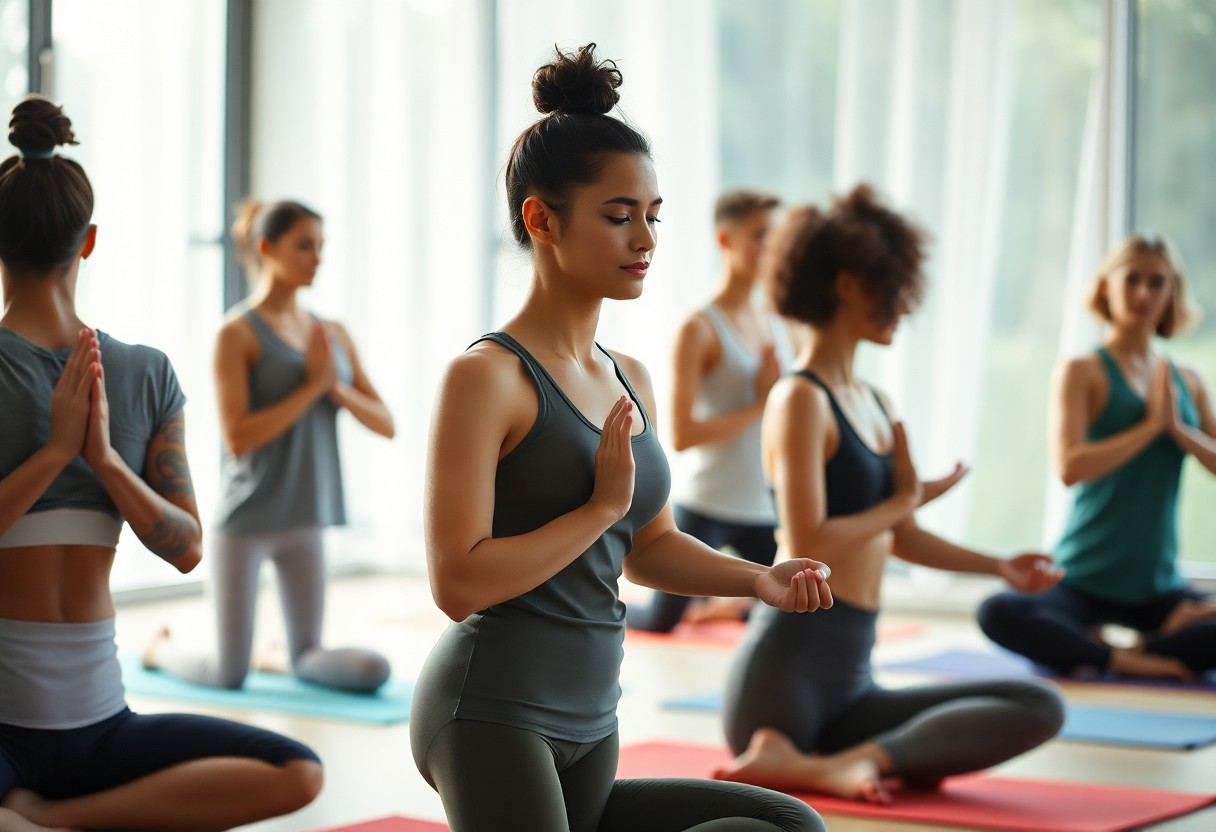
Support Systems for Body Image Improvement
After recognizing the importance of body image improvement, establishing a strong support system can significantly enhance your journey. Surrounding yourself with understanding friends, family members, and professionals can foster an environment where you feel encouraged to embrace your body. These supportive relationships can help you challenge negative thoughts and create a positive dialogue about self-acceptance and self-love.
Seeking Professional Help
Help from mental health professionals, such as therapists or counselors, can be invaluable in addressing body image issues. They provide expert guidance tailored to your individual experiences, enabling you to unpack underlying emotions and develop healthier coping strategies. Seeking this form of help can make a significant difference in achieving a more positive body image.
Building a Support Network
Between friends, family, and even online communities, cultivating a robust support network plays a vital role in your body image journey. By surrounding yourself with individuals who share similar experiences or values, you create a safe space for open dialogue and vulnerability. This network can help reaffirm your self-worth and provide encouragement when faced with challenges.
Also, proactively engaging with your support network is key. You can share your feelings and experiences with trusted individuals, allowing them to offer encouragement and insight. Consider joining local or online support groups focused on body positivity. These communities not only provide shared experiences but also showcase diverse perspectives and approaches to body image improvement, empowering you on your journey towards self-acceptance.
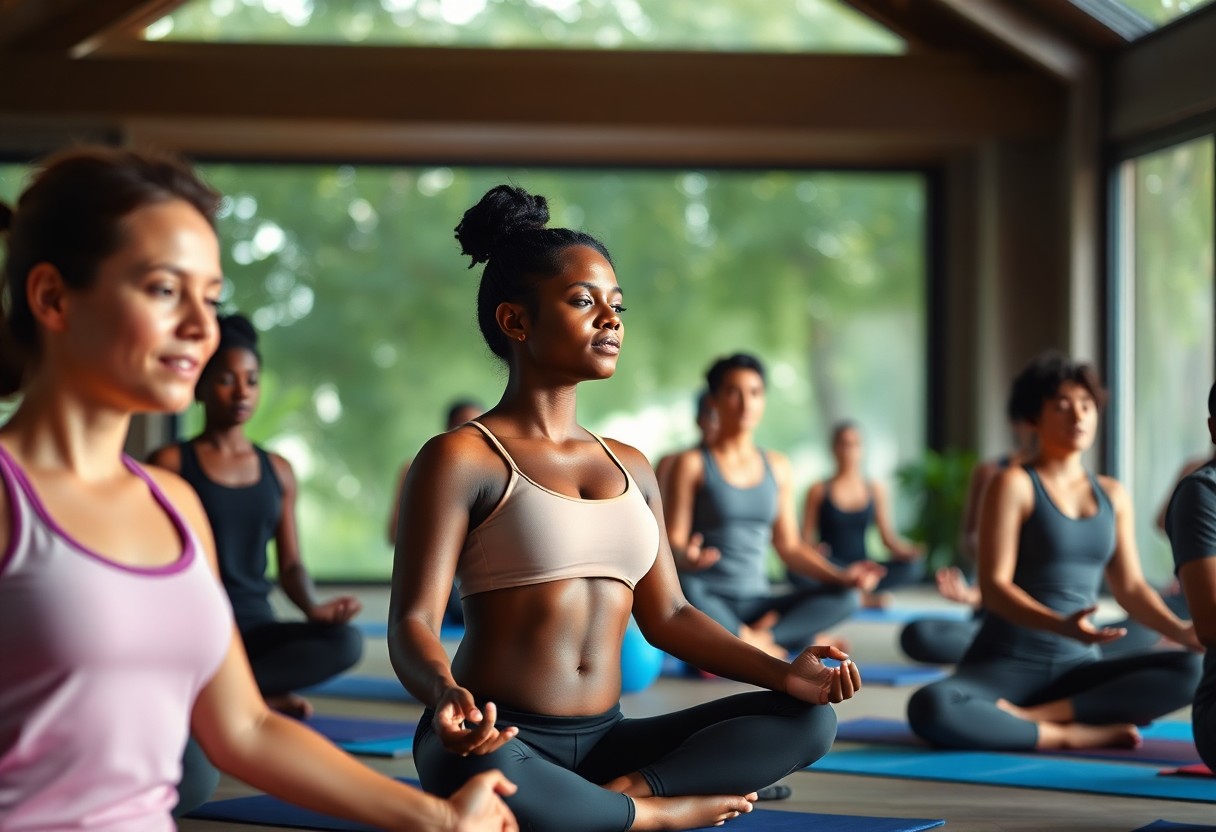
Practical Strategies for Everyday Life
Now is the perfect time to integrate effective strategies that enhance your body image into your daily routine. These practical approaches can empower you to view your body positively and foster a sense of self-acceptance. By making mindful decisions about how you speak to yourself and the goals you set, you can cultivate a healthier mindset and improve your overall well-being.
Daily Affirmations and Positive Self-Talk
To cultivate a positive body image, start incorporating daily affirmations and engaging in uplifting self-talk. By consciously choosing supportive language when speaking to yourself, you can shift your mindset and develop a more loving attitude toward your body. Remind yourself of your unique qualities and strengths, and affirm that you are worthy just as you are.
Setting Realistic Goals
Below are steps to help you set realistic goals that align with a healthy body image. Focus on attainable objectives that promote personal growth rather than superficial changes. This approach will not only bolster your self-esteem but also encourage you to celebrate your progress along the way.
Strategies for setting realistic goals include breaking larger aspirations into smaller, manageable steps. This allows you to celebrate little victories, fostering a sense of achievement. Additionally, consider goals that prioritize your wellness, such as increasing physical activity or practicing mindfulness. By focusing on holistic improvement rather than specific weight targets, you’ll create a more balanced and positive relationship with your body.
To wrap up
Hence, by incorporating positive body image improvement strategies into your daily routine, you can cultivate a healthier mindset towards yourself and your appearance. Focus on self-acceptance, challenge negative thoughts, engage in positive self-talk, and surround yourself with supportive influences. Also, prioritize physical health through balanced nutrition and regular exercise, which empowers you to take control of your well-being. Ultimately, fostering a positive body image not only enhances your self-esteem but also enriches your overall quality of life.
FAQ
Q: What are some effective strategies for improving body image?
A: Some effective strategies include practicing self-compassion, engaging in positive self-talk, surrounding yourself with supportive friends, focusing on your strengths, and participating in activities that promote body positivity, such as yoga or dance. It’s also helpful to limit exposure to negative media influences and engage in mindfulness techniques.
Q: How can I avoid negative body comparison with others?
A: To avoid negative body comparisons, try to limit your social media usage or unfollow accounts that trigger these feelings. Focus on your own journey and achievements instead of looking at others. Practicing gratitude for your own body and its capabilities can also help shift your focus away from comparison.
Q: Is it beneficial to discuss body image issues with a therapist?
A: Yes, discussing body image issues with a therapist can be very beneficial. A mental health professional can provide a safe space to explore your feelings and help develop coping strategies. They can also assist in addressing underlying issues related to self-esteem and body perception.
Q: How does physical activity impact body image?
A: Engaging in physical activity can significantly improve body image by promoting the release of endorphins, which enhance mood. Additionally, physical activity can help individuals appreciate their bodies for what they can do rather than solely how they look. It fosters a sense of achievement and can help build confidence.
Q: Can practicing gratitude really help with body image?
A: Practicing gratitude can indeed help improve body image. By focusing on the positive aspects of your body and what it allows you to do rather than solely its appearance, you cultivate a more positive relationship with yourself. Keeping a gratitude journal that includes body-related items can enhance this practice.
Q: What role does diet play in body image perception?
A: While diet can influence physical health, it’s vital to approach nutrition with a balanced mindset. Restrictive diets may lead to negative body image and unhealthy behaviors. Instead, focus on nourishing your body with wholesome foods and recognize that all bodies deserve care, regardless of size or shape.
Q: How can I support friends or loved ones struggling with body image issues?
A: Supporting friends with body image issues involves listening without judgment, offering encouragement, and helping them focus on their positives. Avoid making negative comments about your own or their bodies. Share resources like body positivity movements or literature that promotes a healthy outlook on self-image to foster their journey toward acceptance.
